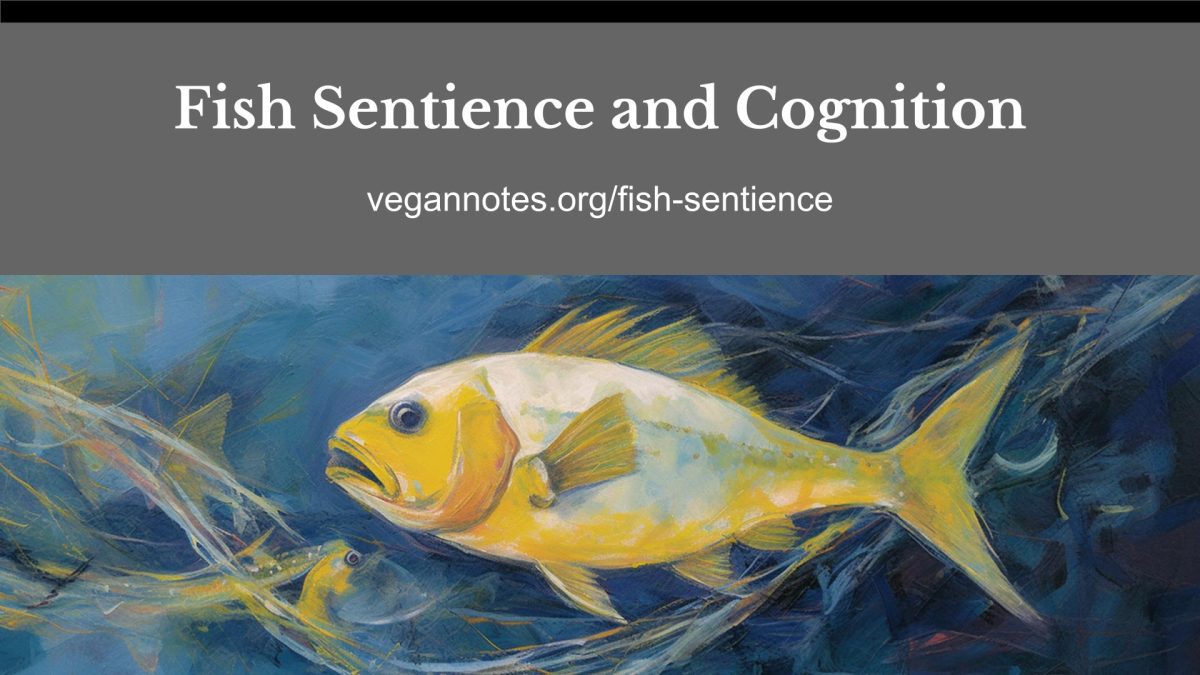
Fish: Sentience and Cognition
About This Page
The notes on this page show that fish feel pain, are sentient, and lead rich cognitive, emotional, and psychological lives.
Sentience is the ability to have feelings and emotions. It is important because it is the criteria by which we should determine if living beings of a particular species are deserving of moral consideration.
Points to Consider
Fish feel pain.
- Marc Bekov, probably the world’s foremost cognitive ethologist, having written over 30 books and hundreds of essays on animal behavior, says that “fish are sentient and emotional beings and clearly feel pain.”[1]Bekoff, Marc. “Fish Are Sentient and Emotional Beings and Clearly Feel Pain.” Psychology Today, June 19, 2014. … Continue reading

- An article published in the Smithsonian Magazine titled “It’s Official: Fish Feel Pain” pointed to numerous studies showing decisively that fish feel pain.[2]Ferris Jabr, Hakai Magazine, “It’s Official: Fish Feel Pain.” January 8, 2018. Smithsonian Magazine
- The American Veterinary Medical Association, which in no way could be considered an animal rights organization because of its close ties with the animal agriculture industry, said that fish “should be accorded the same considerations as terrestrial vertebrates in regard to relief from pain.”[3]Leary, Steven L, and American Veterinary Medical Association. AVMA Guidelines for the Euthanasia of Animals: 2013 Edition, 2013.

- According to Victoria Braithwaite, professor of Fisheries and Biology at Penn State University, “The evidence we have to support sentience and pain perception in fish is as good as anything we have for birds and mammals. Fish, like birds and mammals, have a capacity for self-awareness.” [4]Braithwaite, Victoria. Do Fish Feel Pain? Oxford ; New York: Oxford University Press, 2010. 133-34.
- According to Donald Broom, Emeritus Professor of Animal Welfare at the University of Cambridge, “the evidence of pain system function in fish is so similar to that in humans and other mammals, it is not logical to deduce that fish cannot feel pain.”[5]Broom, Donald. “Fish Brains and Behaviour Indicate Capacity for Feeling Pain.” Animal Sentience Journal. 2016.
- Marquette Natural Sciences professor Colum Brown and coauthor of the book Fish Cognition and Behaviour[6]Culum Brown, Kevin Laland, Jens Krause. Fish Cognition and Behavior, 2nd Edition. Wiley Publishing, 2011, says that “fish experience pain in a manner similar to the rest of the vertebrates.”[7]Brown C. Fish intelligence, sentience and ethics. Anim Cogn. 2015 Jan;18(1):1-17. Epub 2014 Jun 19. PMID: 24942105
Fish display emotions.
- Marc Bekov, probably the world’s foremost cognitive ethologist, having written over 30 books and hundreds of essays on animal behavior, says that “fish are sentient and emotional beings and clearly feel pain.”[8]Bekoff, Marc. “Fish Are Sentient and Emotional Beings and Clearly Feel Pain.” Psychology Today, June 19, 2014. … Continue reading
- Ethologist Dr. Jonathan Balcombe, in one of his 6 books on animal behavior, “What a Fish Knows” shows overwhelming evidence that fish are intelligent, feel pain, display emotions, and have many of the other characteristics of the land animals we use for food. [9]Balcombe, Jonathan. What a Fish Knows: The Inner Lives of Our Underwater Cousins. Scientific American / Farrar, Straus and Giroux, 2016.
- Marquette Natural Sciences professor Colum Brown and coauthor of the book Fish Cognition and Behaviour[10]Culum Brown, Kevin Laland, Jens Krause. Fish Cognition and Behavior, 2nd Edition. Wiley Publishing, 2011, says that “fish perception and cognitive abilities often match or exceed other vertebrates.”[11]Brown C. Fish intelligence, sentience and ethics. Anim Cogn. 2015 Jan;18(1):1-17. Epub 2014 Jun 19. PMID: 24942105
Fish have a sense of themselves and a sense of the future.
- Victoria Braithwaite, professor of Fisheries and Biology at Penn State University, says that “fish, like birds and mammals, have a capacity for self-awareness.” [12]Braithwaite, Victoria. Do Fish Feel Pain? Oxford ; New York: Oxford University Press, 2010. 133-34.
- Fish avoid areas where they have previously had negative experiences, showing that they are able to anticipate the same thing happening again in the future[13]Csányi, Vilmos, and Antal Dóka. “Learning Interactions between Prey and Predator Fish.” Marine Behaviour and Physiology 23, no. 1–4 (October 1993): 63–78.
Fish can experience fear and stress.
- A scientific panel commissioned by the European Commission concluded:
- Fish are able to experience fear, pointing out that fear is useful for defense and escape.
- The stress physiology of fish is “directly comparable to that of higher vertebrates,”
- When exposure to stress is prolonged, it can become chronic and affect the immune system and growth, and may even cause death.[14]Algers, Bo et al. “General Approach to Fish Welfare and to the Concept of Sentience in Fish.” EFSA Journal 7, no. 2 (2009).
Fish have long-term memory and can learn.
- A paper published in the Fish and Fisheries Journal identified several studies showing that fish learn skills from one another, including:
- predator avoidance,
- migration routes,
- food location,
- fighting ability,
- and how to choose a mate.[15]Brown, Culum, and Kevin N Laland. “Social Learning in Fishes: A Review.” Fish and Fisheries 4, no. 3 (September 2003): 280–88.
- A study published in the Journal of Fish Biology reveals:
- that if fish are caught with a hook and released, they remember the experience at least a year later and avoid the hooks.
- if one fish is caught in an area, the entire population becomes very difficult to catch, suggesting that fish learn from each other’s experiences. (this level of avoidance also indicates that being hooked is a painful experience for fish.[16]Beukemaj, J. J. “Acquired Hook-Avoidance in the Pike Esox Lucius L. Fished with Artificial and Natural Baits.” Journal of Fish Biology 2, no. 2 (April 1970): 155–60.
- The ability to learn shows that fish possess and use long-term memory.[17]Odling-Smee, Lucy, and Victoria A Braithwaite. “The Role of Learning in Fish Orientation.” Fish and Fisheries 4, no. 3 (September 2003): 235–46.
Counterclaims Addressed
“Because fish lack a neocortex, they are incapable of suffering”
- Birds and amphibians are known to suffer and feel pain despite not having a neocortex. As a result, it is not reasonable to conclude that fish do not experience pain or suffering based on their brain structure.[18]Cooke, Steven J., and Lynne U. Sneddon. “Animal Welfare Perspectives on Recreational Angling.” Applied Animal Behaviour Science 104, no. 3–4 (May 2007): 176–98.
- Though the brain structure of fish differs from that of mammals, it performs similar functions. Fish possess both an amygdala and a hippocampus, regions of the brain that deal with learning, emotion, and memory.[19]Stockinger, Günther. “The Hook That Hurts: Scientists Tip the Scales Against Anglers.” Spiegel Online, March 11, 2011, sec. International
Related Links
- On this website
- On other websites
- Websites
- Fish Feel. fishfeel.org.
- Articles
- Smithsonian Magazine Article, “It’s Official: Fish Feel Pain.”
- Videos
- Websites
Image Gallery for This Page
This gallery contains only one image—the social media sharing image for the page.
Footnotes
References
| ↑1 | Bekoff, Marc. “Fish Are Sentient and Emotional Beings and Clearly Feel Pain.” Psychology Today, June 19, 2014. https://www.psychologytoday.com/us/blog/animal-emotions/201406/fish-are-sentient-and-emotional-beings-and-clearly-feel-pain |
|---|---|
| ↑2 | Ferris Jabr, Hakai Magazine, “It’s Official: Fish Feel Pain.” January 8, 2018. Smithsonian Magazine |
| ↑3 | Leary, Steven L, and American Veterinary Medical Association. AVMA Guidelines for the Euthanasia of Animals: 2013 Edition, 2013. |
| ↑4, ↑12 | Braithwaite, Victoria. Do Fish Feel Pain? Oxford ; New York: Oxford University Press, 2010. 133-34 |
| ↑5 | Broom, Donald. “Fish Brains and Behaviour Indicate Capacity for Feeling Pain.” Animal Sentience Journal. 2016. |
| ↑6, ↑10 | Culum Brown, Kevin Laland, Jens Krause. Fish Cognition and Behavior, 2nd Edition. Wiley Publishing, 2011 |
| ↑7, ↑11 | Brown C. Fish intelligence, sentience and ethics. Anim Cogn. 2015 Jan;18(1):1-17. Epub 2014 Jun 19. PMID: 24942105 |
| ↑8 | Bekoff, Marc. “Fish Are Sentient and Emotional Beings and Clearly Feel Pain.” Psychology Today, June 19, 2014. https://www.psychologytoday.com/us/blog/animal-emotions/201406/fish-are-sentient-and-emotional-beings-and-clearly-feel-pain |
| ↑9 | Balcombe, Jonathan. What a Fish Knows: The Inner Lives of Our Underwater Cousins. Scientific American / Farrar, Straus and Giroux, 2016. |
| ↑13 | Csányi, Vilmos, and Antal Dóka. “Learning Interactions between Prey and Predator Fish.” Marine Behaviour and Physiology 23, no. 1–4 (October 1993): 63–78. |
| ↑14 | Algers, Bo et al. “General Approach to Fish Welfare and to the Concept of Sentience in Fish.” EFSA Journal 7, no. 2 (2009). |
| ↑15 | Brown, Culum, and Kevin N Laland. “Social Learning in Fishes: A Review.” Fish and Fisheries 4, no. 3 (September 2003): 280–88. |
| ↑16 | Beukemaj, J. J. “Acquired Hook-Avoidance in the Pike Esox Lucius L. Fished with Artificial and Natural Baits.” Journal of Fish Biology 2, no. 2 (April 1970): 155–60. |
| ↑17 | Odling-Smee, Lucy, and Victoria A Braithwaite. “The Role of Learning in Fish Orientation.” Fish and Fisheries 4, no. 3 (September 2003): 235–46. |
| ↑18 | Cooke, Steven J., and Lynne U. Sneddon. “Animal Welfare Perspectives on Recreational Angling.” Applied Animal Behaviour Science 104, no. 3–4 (May 2007): 176–98. |
| ↑19 | Stockinger, Günther. “The Hook That Hurts: Scientists Tip the Scales Against Anglers.” Spiegel Online, March 11, 2011, sec. International |

